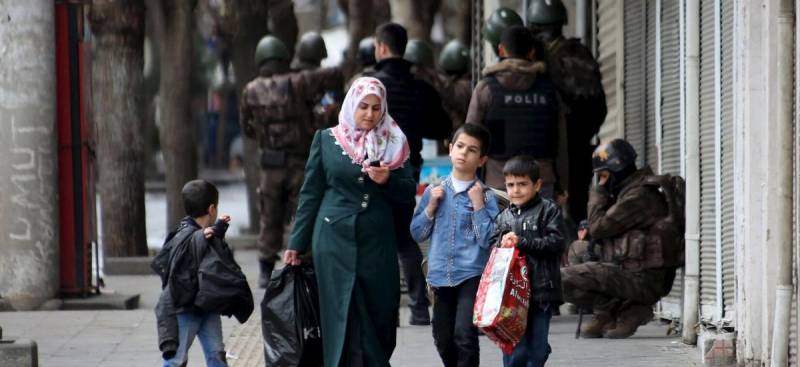Political and civil society representatives in Turkey’s Kurdish-majority southeastern Diyabakır province last week issued a statement pertaining to the pandemic-prompted educational problems facing students in the region.
The coronavirus pandemic has virtually halted schooling in this underdeveloped province that is home to Turkey’s highest unemployment rate and officials are warning that if the current trajectory in schooling cannot be changed, an entire generation will be lost.
Leading the way in problems are lack of infrastructure to support online learning, homes with large numbers of children which makes distance learning virtually impossible and poverty, which prevents children from having access to mobile devices and computers.
“There are 492,975 registered students in Diyarbakır. A total of 4,300 of the 47,228 students who completed eighth grade in 2020, did not register for formal schooling,’’ according to Sadrettin Kaya, the Diyarbakır chairman of Turkey’s Union of Education Workers (Eğitim-Sen).
“We are greatly concerned about children that are outside the fold of formal education,’’ Kaya said as part of a statement issued by the Education Monitoring Commission in Diyarbakır last week.
“With the start of remote learning, the number of children that are able to access the system is quite low. A total of 200,000 students (in Diyarbakır) did not enter the online education system, known as EBA, for even one second between March-June 2020,’’ he explained.
Turkey shut down schools and launched distance learning in March 2020 in a bid to prevent the spread of the coronavirus and has since repeatedly extended the return date for in-class schooling.
The country’s 18 million students are receiving schooling online and on television, through EBA and state-run TRT station.
A science teacher, who teaches in a poor neighbourhood in Diyabakır, explains that there were times when only two or three students will log online for distance-learning classes.
“Many of them do not have iPads or computers and the neighbourhoods they live in lack the infrastructure for Internet service,’’ the teacher says.
Criticising the fact that they must evaluate students based on classes they are not attending, the teacher says colleagues are at a loss as to how to evaluate these children.
“We talk about this with my colleagues all the time,’’ the teachers said. “I plan on giving everyone a 90 percent at a minimum, because I don’t think its fair to take out on the children the problems of the educational system.’’
Another teacher, who works in a village in the southeastern city of Bitlis, questions the closure of schools in villages during the pandemic.
“The authorities weren’t thinking when they made the call about how these children would access the online system,’’ according to the teacher. “The children in my class generally have six to seven siblings… how can so many children in one home access education broadcasts from TV?’’
The teacher goes on to explain the lack of Internet access in remote areas as another problem:
“You need to climb to higher point to get Internet access. And they were doing this when the weather was warmer, but the arrival of winter has made that impossible.’’
The unfortunate part is that many bright students are losing a chance at a good future, the teacher adds.
Some questions that come to mind are why the Turkish Education Ministry did not launch an initiative to strengthen the infrastructure of EBA since March. Or why Internet service problems were not fixed in the region or why disadvantaged children were not given tablets. Why has the academic year been steered so badly by the ministry?
Part of the problem is getting students motivated to attend classes and study with the news system, teachers say.
A teacher in a more affluent neighbourhood in Diyarbakır shares their thoughts.
“We have decided to give students performance based grades this year,’’ the teacher says. “Half of my students don’t attend classes, some due to lack of Internet services and some due to financial constraints, but most of my students have cell phones.’’
The teacher says that the online system is not helping as students don’t care to participate in it and it is impossible to motivate them from a distance.
“I think the teachers and students are just fed up,’’ the teacher adds.
For an employee at a Diyarbakır children’s association, the pandemic has violated the right to education of children.
“The defects in the education system have steered students towards child labour,’’ the employee says. “This is also leading to bullying among peers and domestic violence.’’
The pandemic has affected an entire generation, but the children of poor families in underdeveloped regions have been hit badly.
It appears that the already disadvantaged children in Turkey’s southeast have already lost their chance to catch up to their peers and any chance they may have is slipping further away.
